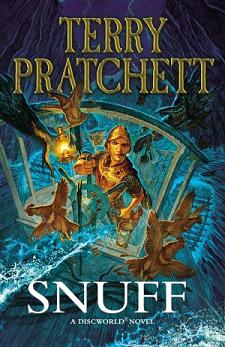
Snuff
Terry Pratchett
416 pages
published in 2011
Wouldn't you know it; you try to start writing a review and suddenly you can't find the bloody book anywhere. Which is not just annoying because I want to get started but also because I'm now worrying I lost it somewhere. If I have I will have lost a piece of history, it being the last Discworld novel she and I read together before her death, as we did with all the new Discworld novels when we were together; usually she read them first as I could be slightly more patient. We not only were both fans of Pratchett, but we actually met thanks to him, through the dedicated IRC channel at lspace.org which had been set up for the alt.fan.pratchett newsgroup. What's more, his documentary this year on assisted suicide and the dignity of choosing your own death helped Sandra make up her mind once she was convinced she couldn't go on anymore.She had thought about it before, but seeing that really firmed up her conviction not to suffer if there was no point to it. Reading Snuff therefore was a bittersweet experience.
Snuff itself is a typical late Pratchett novel, good but not outstanding with few surprises for the longtime fan. Once again, as in Jingo, The Fifth Elephant or Thud to name but three, Samuel Vines is taken out of his element and has to maintain the peace outside of his jurisdiction and once again there are powerful forces who profit from the lack of it he has to conquer. This time Vimes is sent on holiday to his wife, Lady Sybil Ramsbottom's country estate to play the laird, something he's not good at nor likes much. Fun is had with city boy Vimes' discomfort with country ways, again as in previous novels. Finally, there's yet another fantasy race rescued from its stereotypes: after trolls, dwarfs, golems, zombies and vampires it's goblins this time.
And in the Discworld, goblins are natural victims: too weak to be respected for their strength like trolls and dwarfs, lacking the aura of danger of a vampire and with no special powers. Instead goblins practise the religion of Unggue, collecting their bodily fluids: snot, tears, ear wax, toenail clippings and the like, saving them in special Unggue pots they keep from birth and which is their only artform.
They share their fascination with icky stuff with Vimes' young son, five years old and into things that go plop and all that; he loves the countryside and approaches his interests scientifically. Much of which is encouraged by young Sam's favourite author, Felicity Beedle, author of some 57 books, most of which have something to do with poo. Felicity Beedle turns out to be living nearby and to be a goblins rights advocate, attempting to teach them to read and write.
While as usual with the Vimes novels, society is the ultimate villain, but having another patented Pratchett psychopath, Stratford, as the bad guy Vimes has to beat personally, culminating in one of the best set pieces I've seen in the Discworld series.
Snuff is not an innovative or surprising Discworld novel -- and if you were expecting it to be you really don't understand Pratchett. The thing about the Discworld is that Pratchett has always build on what came before in the series, through evolution rather than revolution, that for the most part you know what you are going to get going in. What's important is the story and I found Snuff to be as good as any late Discworld novel.
Since Terry Pratchett has been diagnosed with Alzheimers and this became public knowledge, it is tempting to speculative if this is or is not visible in his writing. One change that is visible is that he has started to dictate rather than write his last few novels; it's slightly less focused, more flabby, in somewhat the same way that when you speak you tend to be more sloppy than when you're writing the same sentences. But apart from that I can't say I've noticed much of Pratchett's Alzheimer problems...
Webpage created 12-10-2011, last updated 04-12-2011.